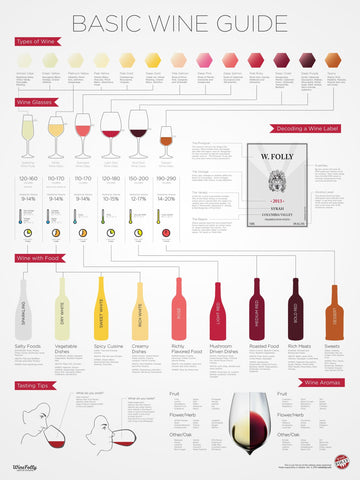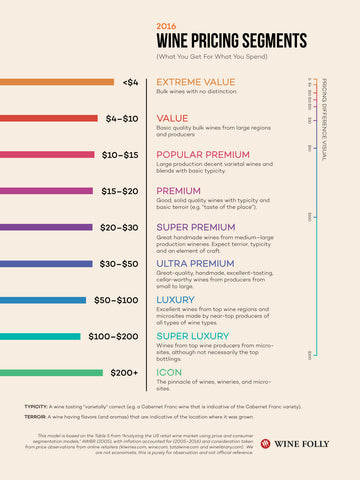Basic Wine Guide Vol. 1: How to Order Wine in a Restaurant
We’re looking at a very complex question that gets posed to us all the time: how do you navigate a restaurant’s wine list to find what you like?
We have decades of industry experience between us at IWWT - much of it spent on dining room floors working as sommeliers to help guests find the right wine for the moment.
The wine world is massive, some of its rules are over-complicated and even we sometimes struggle - despite our extensive experience and knowledge - navigating wine lists with hundreds of entries.
We understand the frustration on a guest’s face when they start looking through a wine list and it feels like it’s written in a different language. We get it.
This guide is our best advice on how to get more out of your dining experiences when it comes to buying wine.
1. Get Familiar With What You Like
This one seems really obvious, right?
Well, you wouldn’t believe how often we’ve gone to speak with a guest who was looking for help with the wine list and they couldn’t even describe the basics of what they like.
“I like red wine” isn’t really helpful. “I like full-bodied reds” or “I like something dry” aren’t very helpful either, although we can start moving in the right direction.
Even simple terms like “sweet” and “full-bodied” have different meanings depending on the person you ask. It’s OK not to know a ton about wine while still being able to enjoy it but you should learn the basics of what you drink.
Expert Advice: learn how to describe the wines you like. Regardless of what brand, region or grape you enjoy, memorize the basic descriptors associated with it. For example, if you like Napa Valley Cabernets, generally you’ll use terms like oaked, fruity, rich, concentrated and tannic as descriptors. If you like a specific brand or label, spend a few minutes researching that wine to learn what terms apply best.

2. Let’s Talk About Money
This might be the most important topic for diners when talking about buying wine from a restaurant’s list.
Yes, price matters.
No, it’s not a comfortable conversation to have in front of your dining companions.
And no, we definitely don’t want to hand you an outrageous bill to make you feel like you got ripped off.
Clearly define your baseline price range. A good sommelier can help you find the best bang for your buck regardless of what price tier you’re shopping in. Just be as honest as you can, we really don’t care if you don’t spring for the most expensive bottle on the list. Our job is to help you find the right wine for that moment.
Expert Advice: if you plan on picking up the bill for dinner, call ahead and leave a reservation note outlining your per bottle budget for that evening. You can also mention that you’d like to keep the conversation discreet in front of your dining companions. The sommelier can work their magic, with clearly defined boundaries, to ensure you have a great experience.

3. Trust The Best Restaurants To Help
It’s really hard to land a position as a sommelier in the best restaurants in Ontario.
It takes a ton of experience, knowledge and service finesse to be entrusted with the keys to the wine cellar in those dining rooms.
A good sommelier will spend a ton of their time mining through the vast world of wine to find the best and most authentic representations. Even if they don’t have the exact label you want, for example, they’ve already done all the ground work to populate the list with stylistically similar alternatives.
Expert Advice: spend a few minutes researching the restaurant; many of the top places make their wine lists available on their websites. Go online and see what others are saying about the wines or you can just call ahead of your reservation and ask to speak with the sommelier who can make recommendations.
4. Don’t Be Afraid To Take A Recommendation
You’ve memorized the basic descriptors for what you like, you’ve thought carefully about how much you want to spend on a bottle of wine and you’ve looked into where you’re dining and feel confident they have good sommeliers working there.
The sommelier is at your table presenting you with one or more recommendations for you to choose from and you’re frozen in time and space.
“Oh God, what if I don’t like the wine I pick?”
“Should I just stick with what I know?”
“I’ve never seen these wines before and I’m not sure what to do.”
In that moment, it’s totally normal to want to stay in your comfort zone. But wine isn’t about a comfort zone. It’s not a trip with a beginning and an end.
Wine experiences span over a lifetime; an experience where your preferences will change over time. The more interested you become the more you start to realize the only way to embrace the world of wine is to open your mind to every tasting opportunity.
There will be wines you do not like. There will be wines that you do not like for that moment. This is a natural part of your journey.
The bottle that gets recommended to you might not hit the sweet spot just right. Or maybe you’ll fall in love with that type of wine - we see it happen all the time - and it’ll be all you want to drink and share with your friends for the next few months.
It is the opportunity to have tried something new that matters.
Expert Advice: if you really don’t like a wine that’s been recommended, most places have hospitality policies to offer to exchange the wine for another. It will happen even with the best preparation and diligence on the part of both yourself and the sommelier. There are moments where we just don’t want something even if we know we love it. Don’t be afraid to speak up and give them an opportunity to enhance your dining experience. Ultimately, making sure you had the best experience possible is what truly matters to us.
After Dinner Thoughts
We hope you’ve enjoyed the information in this basic guide. We know it’s not easy to learn about wine but we hope you can use some of the tips we’ve provided to enhance your dining experiences.
Our team is full of wine professionals able to give advice on a multitude of wine-related subjects. We offer private tasting opportunities for different knowledge levels, customized recommendations on wines we offer and simple, easy-to-understand descriptions of our wines.
Thank you for spending a few minutes of your time with us.

